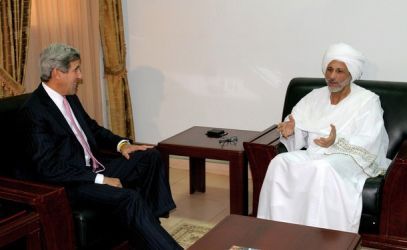Sudan says committed to Doha talks, unlinks it from Mbeki process in Darfur
January 5, 2011 (KHARTOUM) — Sudanese government has reaffirmed today its commitment to Doha process to end Darfur conflict and dissociated it from an internal strategy it intends to launch.

Presidential Adviser Ghazi Salah Al-Deen who supervises Khartoum’s policy on Darfur met today with the visiting US Senator John Kerry and European Union envoy to Sudan Rosalind Marsden to discuss issues related to peace in the country including western Sudan.
“The government did not stop dealing with the Doha process for peace in Darfur,” Ghazi said Wednesday after a meeting with Senator Kerry on the eve of an international meeting on Darfur in Doha.
The Sudanese official further delinked the internal efforts carried out by his government to end the conflict from the peace talks with the rebel groups brokered by the mediation in Doha.
“Negotiating from inside Sudan did not stop and this process is not linked to any action taken place recently in Doha,” he said, referring to the return of government delegation to Khartoum.
Ghazi further stressed that the efforts for peace do not “concern the armed movements only, but include groups and communities in Darfur” and this process represents “a move to the final phase of resolving Western Sudan conflict as it was described as Darfur-Darfur dialogue by the African Union,” he said.
The Joint Chief Mediator Djibril Bassole recently said efforts for peace in Darfur from inside Sudan should start after the conclusion of peace accord in Doha with the rebel groups and the end of violence in the region. He further said it does not represent an alternative to Doha.
Following an ultimatum given by President Bashir to stop talks with rebel groups in Doha, Sudan recalled its delegation form Doha saying it would keep contacts with the mediation from Doha. Khartoum also showed reservations to proposals made by the mediation on pending issues in the talks with Liberation and Justice Movement.
The official in charge of Darfur issue went to reaffirm “Sudan’s readiness to hold talks with the other parties (rebel groups) in Doha when the latter “prove their seriousness to reach a negotiated lasting agreement”.
After another meeting held with EU envoy to Sudan, The presidential adviser also repeated his intention to start the dialogue process inside Darfur chaired by the former South African president.
In a speech delivered Wednesday in Khartoum, the head of the African panel Thabo Mbeki linked between a peace agreement reached in Doha and the “Inclusive Process” that he intends to broker.
The Doha “agreement will require the support of the people of Darfur as a whole,” he said in forum on peace in Sudan organized by the University of Khartoum on Wednesday.
“Accordingly it has been agreed that the outcome of the Doha negotiations will, as soon as possible, be submitted to an inclusive process which will take place in Darfur, to give the people in this region the opportunity to help to determine their future within the Republic of Sudan.”
Mbeki who head the African panel went to disclose his intention to transform the role of his panel to a new mediation he plans to launch in the restive region of Darfur with the support of the Sudanese government.
“The agreement which will emerge through the inclusive Darfur process will address all the necessary issues, such as power and wealth sharing, compensation and development, justice and reconciliation, and the place of Darfur within the larger Sudanese polity.”
Mbeki who called in 2007 with President Al-Bashir for an international action against rebel groups, seemingly wants Doha to deal with the rebels as he will manage the rest in parallel internal process prioritizing the role of civil society and tribal groups and local institutions mainly supportive to the government.
However, the conclusions of the two process “may be divergent if not opposed, and this might complicate the implementation of agreements reached here and there,” said an European diplomat in Khartoum preferring not to be identified.
Canada’s foreign minister Lawrence Cannon, today regretted the departure of the Sudanese government delegation from Doha
“Canada is disappointed by the Government of Sudan’s decision to suspend its participation in the Darfur peace process. Sudan took this decision only days after a leading rebel group, the Justice and Equality Movement, re-engaged in ceasefire negotiations. Leaving the Doha talks now shows a lack of commitment to negotiations,” the minister said.
(ST)

Paul Ongee
Sudan says committed to Doha talks, delinks it from Mbeki process in Darfur
What is wrong with Khartoum? Khartoum only commits itself if he sits behind the wheel of Doha peace process. Now the contradiction is clear, things are not working out as expected because someone else is gonna get the peace process revived with demonstration of real commitment from the negotiating partners.
Khartoum pretended to show commitment in Doha while internally violating cease fire agreement and employing military approach on the ground. Which of the two options—military confrontation or diplomacy—that can convince Darfur rebel groups to show up at the negotiating table? Why engage in military confrontations at weekly or monthly intervals?
Cease fire must be observed first on the ground before coming up with a new internal strategy to support the internationally backed one in Doha. This is the only way forward to resolve the Darfur issue peacefully. Compromise has to take center stage instead of putting unnecessary blame on prominent western members of international community.
Paul Ongee
Khartoum, Sudan